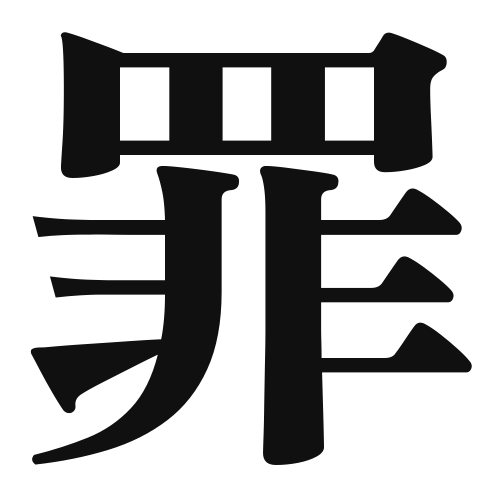1. Overview of Meaning
The kanji “罪” (pronounced “zai” in Japanese) means “sin” or “crime.” It refers to an act that is considered wrong or immoral, often leading to punishment or guilt.
2. Formation and Radical
The kanji “罪” is a compound character that combines elements to convey its meaning. It consists of the radical 罒 (which relates to nets or traps) and the character 罪 itself, which signifies wrongdoing.
The radical 罒 suggests entrapment, indicating that a “罪” is something that ensnares a person morally or legally.
3. Examples of Usage
Common words and phrases that include “罪” are:
- 罪悪感 (zaiakukan) – guilt
- 罪人 (zainin) – sinner or criminal
- 罪を犯す (tsumi o okasu) – to commit a crime
Example sentence in daily conversation:
「彼は自分の罪を悔いている。」 (Kare wa jibun no tsumi o kuwaite iru.) – “He is regretting his sin.”
4. Synonyms and Antonyms
Similar kanji with related meanings include:
- 悪 (aku) – evil or bad, which emphasizes the moral aspect of wrongdoing.
- 過ち (ayamachi) – mistake, which can imply a less severe wrongdoing.
Antonyms include:
- 善 (zen) – good, which represents moral righteousness.
5. Cultural and Historical Background
The concept of “罪” is deeply rooted in Japanese culture, where moral and ethical behavior is highly valued. It is often discussed in the context of personal responsibility and societal norms.
Proverbs and idiomatic expressions related to “罪” include:
- 罪を憎んで人を憎まず (Tsumi o nikunde hito o nikumazu) – “Hate the sin, not the sinner,” emphasizing the distinction between actions and the individual.
